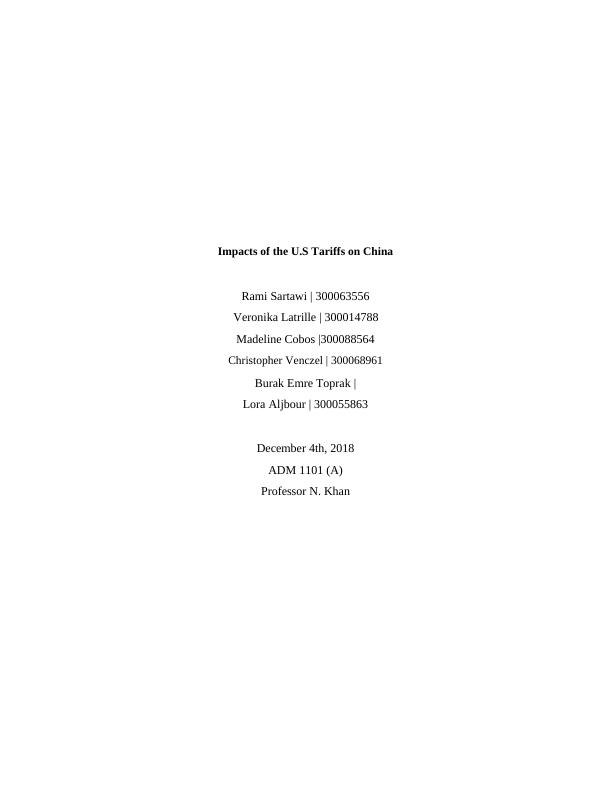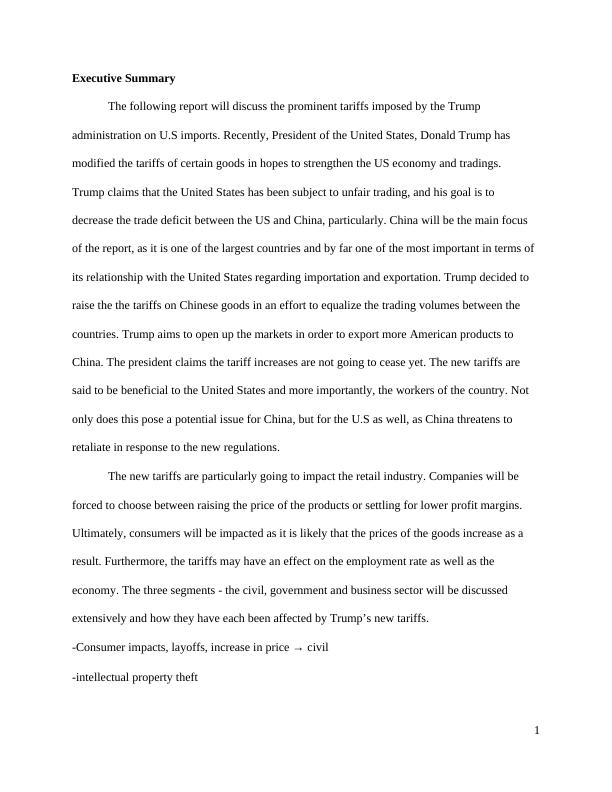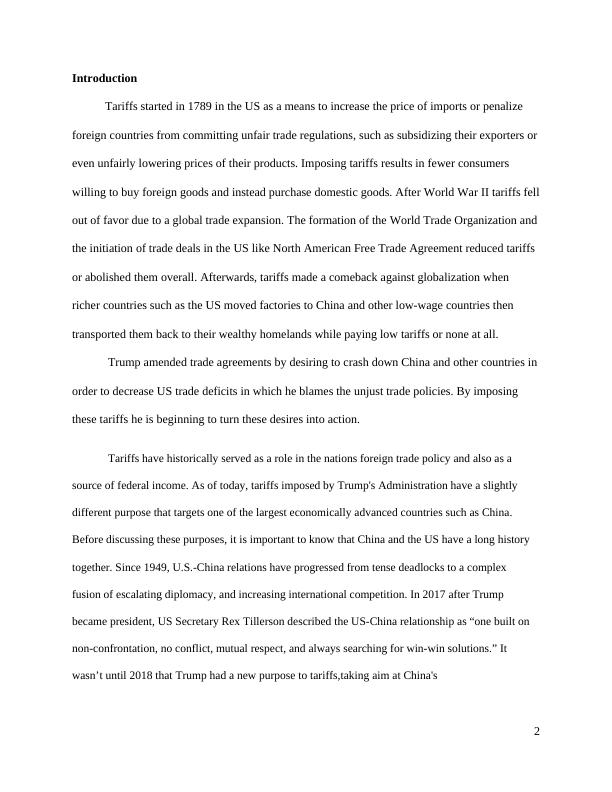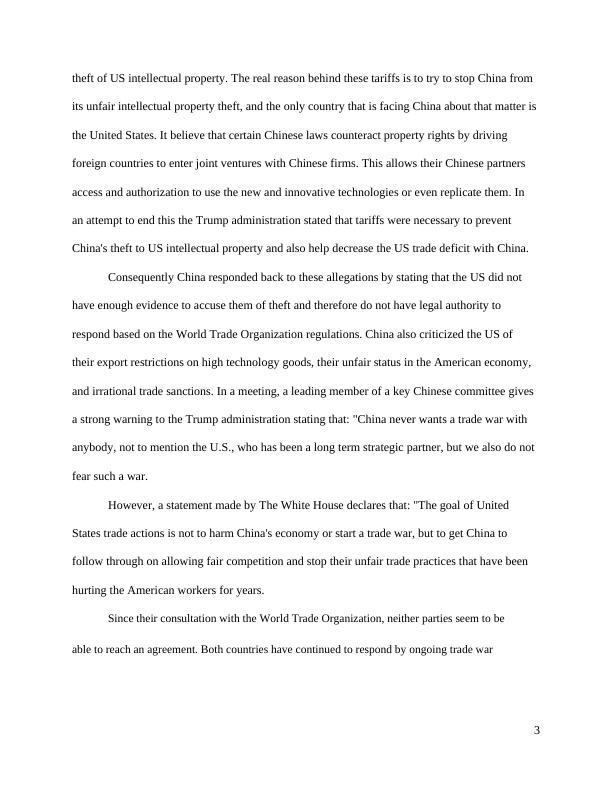Impacts of the U.S Tariffs on China
Added on 2023-05-28
17 Pages4499 Words281 Views
Impacts of the U.S Tariffs on China
Rami Sartawi | 300063556
Veronika Latrille | 300014788
Madeline Cobos |300088564
Christopher Venczel | 300068961
Burak Emre Toprak |
Lora Aljbour | 300055863
December 4th, 2018
ADM 1101 (A)
Professor N. Khan
Rami Sartawi | 300063556
Veronika Latrille | 300014788
Madeline Cobos |300088564
Christopher Venczel | 300068961
Burak Emre Toprak |
Lora Aljbour | 300055863
December 4th, 2018
ADM 1101 (A)
Professor N. Khan

Executive Summary
The following report will discuss the prominent tariffs imposed by the Trump
administration on U.S imports. Recently, President of the United States, Donald Trump has
modified the tariffs of certain goods in hopes to strengthen the US economy and tradings.
Trump claims that the United States has been subject to unfair trading, and his goal is to
decrease the trade deficit between the US and China, particularly. China will be the main focus
of the report, as it is one of the largest countries and by far one of the most important in terms of
its relationship with the United States regarding importation and exportation. Trump decided to
raise the the tariffs on Chinese goods in an effort to equalize the trading volumes between the
countries. Trump aims to open up the markets in order to export more American products to
China. The president claims the tariff increases are not going to cease yet. The new tariffs are
said to be beneficial to the United States and more importantly, the workers of the country. Not
only does this pose a potential issue for China, but for the U.S as well, as China threatens to
retaliate in response to the new regulations.
The new tariffs are particularly going to impact the retail industry. Companies will be
forced to choose between raising the price of the products or settling for lower profit margins.
Ultimately, consumers will be impacted as it is likely that the prices of the goods increase as a
result. Furthermore, the tariffs may have an effect on the employment rate as well as the
economy. The three segments - the civil, government and business sector will be discussed
extensively and how they have each been affected by Trump’s new tariffs.
-Consumer impacts, layoffs, increase in price → civil
-intellectual property theft
1
The following report will discuss the prominent tariffs imposed by the Trump
administration on U.S imports. Recently, President of the United States, Donald Trump has
modified the tariffs of certain goods in hopes to strengthen the US economy and tradings.
Trump claims that the United States has been subject to unfair trading, and his goal is to
decrease the trade deficit between the US and China, particularly. China will be the main focus
of the report, as it is one of the largest countries and by far one of the most important in terms of
its relationship with the United States regarding importation and exportation. Trump decided to
raise the the tariffs on Chinese goods in an effort to equalize the trading volumes between the
countries. Trump aims to open up the markets in order to export more American products to
China. The president claims the tariff increases are not going to cease yet. The new tariffs are
said to be beneficial to the United States and more importantly, the workers of the country. Not
only does this pose a potential issue for China, but for the U.S as well, as China threatens to
retaliate in response to the new regulations.
The new tariffs are particularly going to impact the retail industry. Companies will be
forced to choose between raising the price of the products or settling for lower profit margins.
Ultimately, consumers will be impacted as it is likely that the prices of the goods increase as a
result. Furthermore, the tariffs may have an effect on the employment rate as well as the
economy. The three segments - the civil, government and business sector will be discussed
extensively and how they have each been affected by Trump’s new tariffs.
-Consumer impacts, layoffs, increase in price → civil
-intellectual property theft
1

Introduction
Tariffs started in 1789 in the US as a means to increase the price of imports or penalize
foreign countries from committing unfair trade regulations, such as subsidizing their exporters or
even unfairly lowering prices of their products. Imposing tariffs results in fewer consumers
willing to buy foreign goods and instead purchase domestic goods. After World War II tariffs fell
out of favor due to a global trade expansion. The formation of the World Trade Organization and
the initiation of trade deals in the US like North American Free Trade Agreement reduced tariffs
or abolished them overall. Afterwards, tariffs made a comeback against globalization when
richer countries such as the US moved factories to China and other low-wage countries then
transported them back to their wealthy homelands while paying low tariffs or none at all.
Trump amended trade agreements by desiring to crash down China and other countries in
order to decrease US trade deficits in which he blames the unjust trade policies. By imposing
these tariffs he is beginning to turn these desires into action.
Tariffs have historically served as a role in the nations foreign trade policy and also as a
source of federal income. As of today, tariffs imposed by Trump's Administration have a slightly
different purpose that targets one of the largest economically advanced countries such as China.
Before discussing these purposes, it is important to know that China and the US have a long history
together. Since 1949, U.S.-China relations have progressed from tense deadlocks to a complex
fusion of escalating diplomacy, and increasing international competition. In 2017 after Trump
became president, US Secretary Rex Tillerson described the US-China relationship as “one built on
non-confrontation, no conflict, mutual respect, and always searching for win-win solutions.” It
wasn’t until 2018 that Trump had a new purpose to tariffs,taking aim at China's
2
Tariffs started in 1789 in the US as a means to increase the price of imports or penalize
foreign countries from committing unfair trade regulations, such as subsidizing their exporters or
even unfairly lowering prices of their products. Imposing tariffs results in fewer consumers
willing to buy foreign goods and instead purchase domestic goods. After World War II tariffs fell
out of favor due to a global trade expansion. The formation of the World Trade Organization and
the initiation of trade deals in the US like North American Free Trade Agreement reduced tariffs
or abolished them overall. Afterwards, tariffs made a comeback against globalization when
richer countries such as the US moved factories to China and other low-wage countries then
transported them back to their wealthy homelands while paying low tariffs or none at all.
Trump amended trade agreements by desiring to crash down China and other countries in
order to decrease US trade deficits in which he blames the unjust trade policies. By imposing
these tariffs he is beginning to turn these desires into action.
Tariffs have historically served as a role in the nations foreign trade policy and also as a
source of federal income. As of today, tariffs imposed by Trump's Administration have a slightly
different purpose that targets one of the largest economically advanced countries such as China.
Before discussing these purposes, it is important to know that China and the US have a long history
together. Since 1949, U.S.-China relations have progressed from tense deadlocks to a complex
fusion of escalating diplomacy, and increasing international competition. In 2017 after Trump
became president, US Secretary Rex Tillerson described the US-China relationship as “one built on
non-confrontation, no conflict, mutual respect, and always searching for win-win solutions.” It
wasn’t until 2018 that Trump had a new purpose to tariffs,taking aim at China's
2

theft of US intellectual property. The real reason behind these tariffs is to try to stop China from
its unfair intellectual property theft, and the only country that is facing China about that matter is
the United States. It believe that certain Chinese laws counteract property rights by driving
foreign countries to enter joint ventures with Chinese firms. This allows their Chinese partners
access and authorization to use the new and innovative technologies or even replicate them. In
an attempt to end this the Trump administration stated that tariffs were necessary to prevent
China's theft to US intellectual property and also help decrease the US trade deficit with China.
Consequently China responded back to these allegations by stating that the US did not
have enough evidence to accuse them of theft and therefore do not have legal authority to
respond based on the World Trade Organization regulations. China also criticized the US of
their export restrictions on high technology goods, their unfair status in the American economy,
and irrational trade sanctions. In a meeting, a leading member of a key Chinese committee gives
a strong warning to the Trump administration stating that: "China never wants a trade war with
anybody, not to mention the U.S., who has been a long term strategic partner, but we also do not
fear such a war.
However, a statement made by The White House declares that: "The goal of United
States trade actions is not to harm China's economy or start a trade war, but to get China to
follow through on allowing fair competition and stop their unfair trade practices that have been
hurting the American workers for years.
Since their consultation with the World Trade Organization, neither parties seem to be
able to reach an agreement. Both countries have continued to respond by ongoing trade war
3
its unfair intellectual property theft, and the only country that is facing China about that matter is
the United States. It believe that certain Chinese laws counteract property rights by driving
foreign countries to enter joint ventures with Chinese firms. This allows their Chinese partners
access and authorization to use the new and innovative technologies or even replicate them. In
an attempt to end this the Trump administration stated that tariffs were necessary to prevent
China's theft to US intellectual property and also help decrease the US trade deficit with China.
Consequently China responded back to these allegations by stating that the US did not
have enough evidence to accuse them of theft and therefore do not have legal authority to
respond based on the World Trade Organization regulations. China also criticized the US of
their export restrictions on high technology goods, their unfair status in the American economy,
and irrational trade sanctions. In a meeting, a leading member of a key Chinese committee gives
a strong warning to the Trump administration stating that: "China never wants a trade war with
anybody, not to mention the U.S., who has been a long term strategic partner, but we also do not
fear such a war.
However, a statement made by The White House declares that: "The goal of United
States trade actions is not to harm China's economy or start a trade war, but to get China to
follow through on allowing fair competition and stop their unfair trade practices that have been
hurting the American workers for years.
Since their consultation with the World Trade Organization, neither parties seem to be
able to reach an agreement. Both countries have continued to respond by ongoing trade war
3

End of preview
Want to access all the pages? Upload your documents or become a member.
Related Documents
Economics: Impact of Protectionism Policies, Emerging Economies, and Fiscal and Monetary Policieslg...
|9
|1905
|366
Trump's Nationalistic Philosophylg...
|5
|771
|441
Impact of the Imposition of Tariffs by the united states on turkey Report 2022lg...
|6
|1113
|10
US-CHINA TRADE WAR.The world two-largest economies China and United Stateslg...
|10
|2576
|16
The Global Business Environmentlg...
|7
|1807
|267
Rising Risks for Global Social Media Firmslg...
|13
|2020
|99
